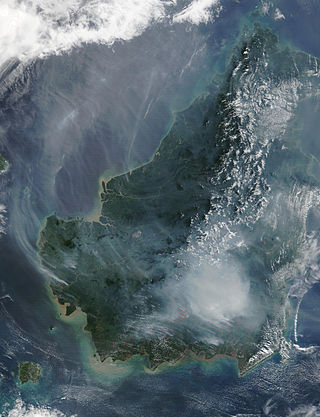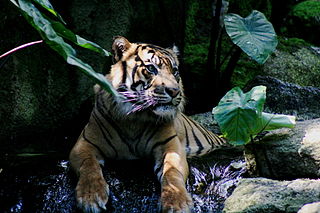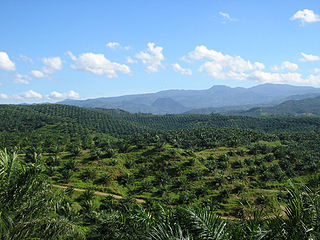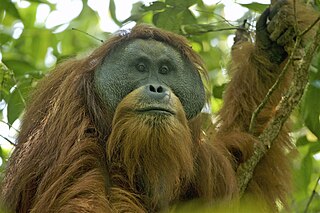
Orangutans are great apes native to the rainforests of Indonesia and Malaysia. They are now found only in parts of Borneo and Sumatra, but during the Pleistocene they ranged throughout Southeast Asia and South China. Classified in the genus Pongo, orangutans were originally considered to be one species. From 1996, they were divided into two species: the Bornean orangutan and the Sumatran orangutan. A third species, the Tapanuli orangutan, was identified definitively in 2017. The orangutans are the only surviving species of the subfamily Ponginae, which diverged genetically from the other hominids between 19.3 and 15.7 million years ago.

Palm oil is an edible vegetable oil derived from the mesocarp of the fruit of oil palms. The oil is used in food manufacturing, in beauty products, and as biofuel. Palm oil accounted for about 36% of global oils produced from oil crops in 2014. Palm oils are easier to stabilize and maintain quality of flavor and consistency in ultra-processed foods, so they are frequently favored by food manufacturers. Globally, humans consumed an average of 7.7 kg (17 lb) of palm oil per person in 2015. Demand has also increased for other uses, such as cosmetics and biofuels, encouraging the growth of palm oil plantations in tropical countries.

The sun bear is a species in the family Ursidae occurring in the tropical forests of Southeast Asia. It is the smallest bear species, standing nearly 70 cm (28 in) at the shoulder and weighing 25–65 kg (55–143 lb). It is stockily built, with large paws, strongly curved claws, small, rounded ears and a short snout. The fur is generally short and jet black, but can vary from grey to red. The sun bear gets its name from its characteristic orange to cream-coloured chest patch. Its unique morphology—inward-turned front feet, flattened chest, powerful forelimbs with large claws—suggests adaptations for climbing.

Ponginae, also known as the Asian hominids, is a subfamily in the family Hominidae. Once a diverse lineage of Eurasian apes, the subfamily has only one extant genus, Pongo (orangutans), which contains three extant species; the Sumatran orangutan, the Tapanuli orangutan and the Bornean orangutan. All three species are listed as critically endangered by the International Union for Conservation of Nature (IUCN).

Peat swamp forests are tropical moist forests where waterlogged soil prevents dead leaves and wood from fully decomposing. Over time, this creates a thick layer of acidic peat. Large areas of these forests are being logged at high rates.

The Sumatran orangutan is one of the three species of orangutans. Critically endangered, and found only in the north of the Indonesian island of Sumatra, it is rarer than the Bornean orangutan but more common than the recently identified Tapanuli orangutan, also found in Sumatra. Its common name is based on two separate local words, "orang" and "hutan" ("forest"), derived from Malay, and translates as 'person of the forest'.

The Borneo peat swamp forests ecoregion, within the tropical and subtropical moist broadleaf forests biome, are on the island of Borneo, which is divided between Brunei, Indonesia and Malaysia.

The Bornean orangutan is a species of orangutan endemic to the island of Borneo. Together with the Sumatran orangutan and Tapanuli orangutan, it belongs to the only genus of great apes native to Asia. It is the largest of the three species of orangutans. Like the other great apes, orangutans are highly intelligent, displaying tool use and distinct cultural patterns in the wild. Orangutans share approximately 97% of their DNA with humans. Also called mias by the local population, the Bornean orangutan is a critically endangered species, with deforestation, palm oil plantations, and hunting posing a serious threat to its continued existence.

The fauna of Indonesia is characterised by high levels of biodiversity and endemicity due to its distribution over a vast tropical archipelago. Indonesia divides into two ecological regions; western Indonesia which is more influenced by Asian fauna, and the east which is more influenced by Australasian species.
The gray tree rat is a species of rodent in the family Muridae. only species in the genus Lenothrix. It is found in forests in Indonesia and Malaysia. A common species, the IUCN has rated it as being of "least concern".

The Borneo Orangutan Survival (BOS) Foundation is an Indonesian non-profit non-governmental organization founded by Dr. Willie Smits in 1991 and dedicated to the conservation of the endangered Bornean orangutan and its habitat through the involvement of local people. It is audited by an external auditor company and operates under the formal agreement with the Indonesian Ministry of Forestry to conserve and rehabilitate orangutans. The BOS Foundation manages orangutan rescue, rehabilitation and re-introduction programmes in East and Central Kalimantan. With more than 400 orangutans in its care and employing more than 440 people at a 10 sites BOS Foundation is the biggest non-human primate conservation non-governmental organization worldwide. Nyaru Menteng and Samboja Lestari are the BOS Foundation sites that have received most extensive media coverage. Nyaru Menteng, founded by Lone Drøscher Nielsen, has been the subject of a number of TV series, including Orangutan Diary, Orangutan Island and the series Orangutan Jungle School, airing since 2018.

Palm oil, produced from the oil palm, is a basic source of income for many farmers in South East Asia, Central and West Africa, and Central America. It is locally used as cooking oil, exported for use in much commercial food and personal care products and is converted into biofuel. It produces up to 10 times more oil per unit area than soybeans, rapeseed or sunflowers.

The Roundtable on Sustainable Palm Oil (RSPO) was established in 2004 with the objective of promoting the growth and use of sustainable palm oil products through global standards and multistakeholder governance. The seat of the association is in Zürich, Switzerland, while the secretariat is currently based in Kuala Lumpur, with a satellite office in Jakarta. RSPO currently has 5,650 members from 94 countries.

Willie Smits is a trained forester, a microbiologist, conservationist, animal welfare activist, wilderness engineer and social entrepreneur. He has lived in Indonesia since 1985 and is an Indonesian citizen. He is married to Adrienne C. Watson since March 2016.

Deforestation in Borneo has taken place on an industrial scale since the 1960s. Borneo, the third largest island in the world, divided between Indonesia, Malaysia and Brunei, was once covered by dense tropical and subtropical rainforests.

Samboja Lestari is a Bornean orangutan rescue and rehabilitation centre, tropical rainforest restoration project, sun bear sanctuary, and eco-lodge located in the district of Samboja in Kutai Kartanegara Regency, East Kalimantan, Indonesia, owned and operated by the Borneo Orangutan Survival (BOS) Foundation. According to its founder, Willie Smits, Samboja Lestari uses the principles of People, Planet, Profit, attempting to provide incomes for local people using conservation. It is located about 38 kilometres from Balikpapan.

Palm oil production is important to the economy of Indonesia as the country is the world's biggest producer and consumer of the commodity, providing about half of the world's supply. In 2016, Indonesia produced over 34.6 million metric tons of palm oil, and exported 25.1 million metric tons of it. Oil palm plantations stretch across at least 12 million hectares. There are several different types of plantations, including small, privately owned plantations, and larger, state-owned plantations. There are a variety of health, environmental, and societal impacts that result from the production of palm oil in Indonesia. A recent publication by the NGO Rainforest Action Network (RAN) indicates that the use of palm oil by some of the biggest chocolate and snacks' producers is increasing this problem.

The Tapanuli orangutan is a species of orangutan restricted to South Tapanuli in the island of Sumatra in Indonesia. It is one of three known species of orangutan, alongside the Sumatran orangutan, found farther northwest on the island, and the Bornean orangutan. It was described as a distinct species in 2017. As of 2018, there are roughly 800 individuals of this species and it is currently on the critically endangered species list.
PT Agro Bukit is a palm oil company from Indonesia. Its headquarters is in Sampit, Central Kalimantan. It is a subsidiary of Goodhope Asia Holdings Ltd, part of Sri Lankan conglomerate Carson Cumberbatch. It is or used to be active in South Kalimantan and Central Kalimantan. In 2012, the government of East Kotawaringin Regency in Central Kalimantan has told the company to temporarily halt part of its operations for allegedly violating its concession permit.

There are three species of orangutan. The Bornean orangutan, the most common, can be found in Kalimantan, Indonesia and Sarawak and Sabah in Malaysia. The Sumatran orangutan and the Tapanuli orangutan are both only found in Sumatra, Indonesia. The conservation status of all three of these species is critically endangered, according to the International Union for Conservation of Nature (IUCN) Red List.

















